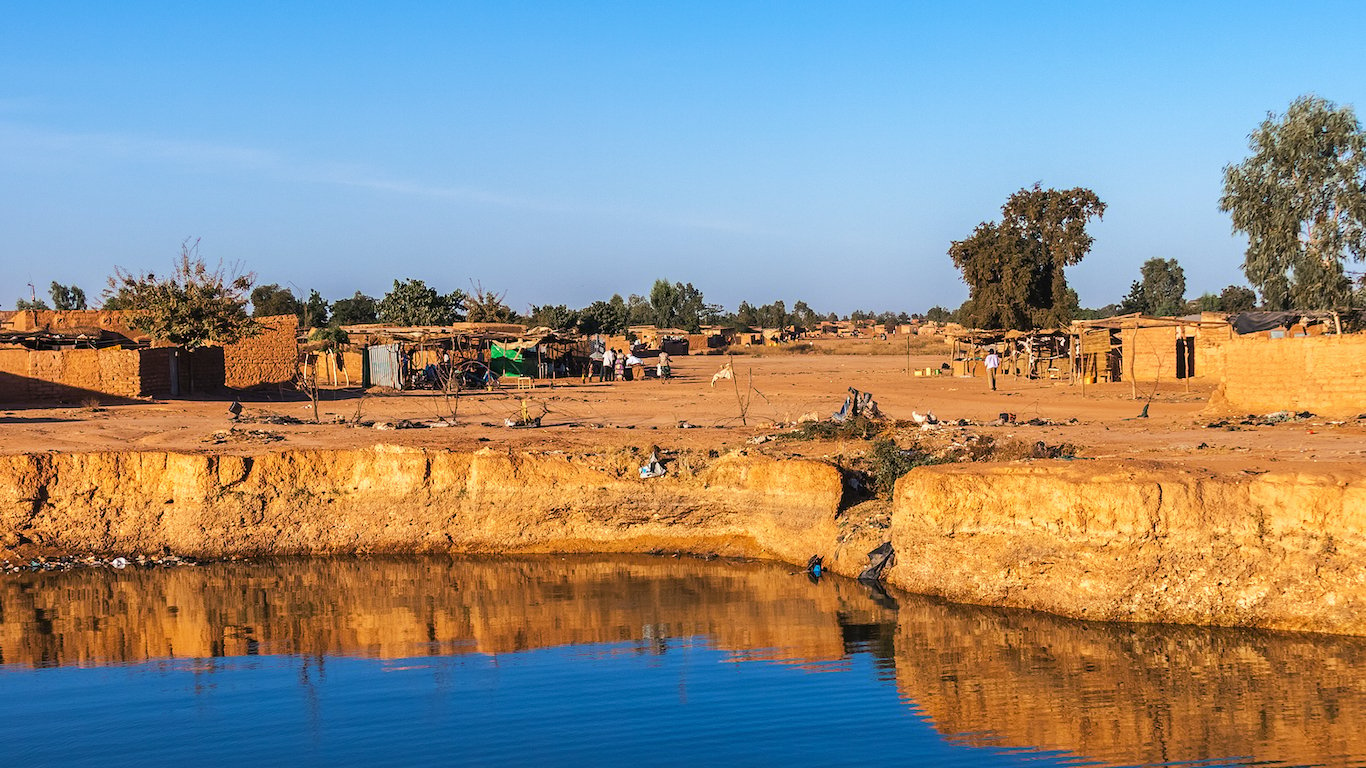Taylor Swift recently canceled a spate of shows in Austria after terrorism threats; the very credible threat targeted tens of thousands of people. Amidst rising terrorist claims throughout Europe, the U.S. State Department recently issued a Level 2 travel advisory for Italy, suggesting that terrorists could attack without warning and at any time. Italy is typically a relatively safe country for Americans to travel to. As such, this type of travel advisory is considered “rare” for the area. But with terroristic threats becoming increasingly common, Americans may see more travel advisory for Europe in the future. Not every travel advisory means that you should not visit an area. But you should consider your safety when making travel plans. (If you do travel to Europe, consider Spain — here’s how much a trip to Barcelona would cost if you’re traveling on a budget or in style.)
Currently, the U.S. State Department ranks all areas of the world based on a 4-tier system from safest to most dangerous. Level 1 (Exercise Normal Precautions) countries are considered safest to travel to. Travelers should exercise reasonable precautions such as remaining vigilant, keeping an eye on their belongings, not flashing money, and not drawing unwanted attention by being loud and obnoxious. Level 2 (Exercise Increased Caution) countries are fairly safe, but there are chances of civil unrest, crime, or harrassment — so avoid high-risk areas. Reconsider travel to Level 3 countries, as you might face significant risks to your life or property. For example, a natural disaster may have occurred that has disrupted basic services, supplies, and medical care. Finally, Level 4 countries are the highest threat level rating, and Americans are encouraged: “Do not travel.” These countries have significant threats of war, extreme terrorism, or armed rebellions. The U.S. government may not be able to assist citizens endangered in these countries. Here, 24/7 Wall St. used State Department data to identify all countries with a Level 4 threat level, and the problems specific to each nation. They are listed in alphabetical order. All of these are current as of September 2024.
Why We’re Covering This

Traveling overseas can be exciting, educational, and relaxing. Visiting and getting to know different countries are opportunities that many of us remember for a lifetime. We meet great people, eat delicious food, and immerse ourselves in new cultures. However, while most vacationers place priority on fun and good times, we have to remember the most important aspect of our trip is safety. We might assume that we know which countries are dangerous enough to avoid, but travel advisories can change quickly. For example, just a year ago, Israel was a relatively safe place to travel to. With the recent war on Gaza, this is no longer the case. This list will help you plan your leisure travel, while remaining safe.
Here are the most unsafe countries to travel to, according to the U.S. State Department:
1. Afghanistan

- Problems: With the departure of American troops in 2021, the Taliban retook control of Afghanistan. The new government is guilty of human rights abuses against its own citizens and foreigners.
- Risks: Terrorism, risk of wrongful detention, civil unrest, kidnapping, and crime
- Other: The country suffers from the effects of drought, earthquakes, mines and unexploded ordnance, and shortages of medical supplies and other necessities. The U.S. Embassy in Kabul also shut down in 2021.
2. Belarus

- Problems: Belarus is allied with Russia and has been used as a staging ground in the Russian invasion of Ukraine. While it is not directly involved in the war, it could become so in the future. Russian military is collecting in Belarus, and the possibility of violent outbreaks is possible.
- Risks: Russian military buildup, arbitrary law enforcement, potential civil unrest, risk of detention, Embassy’s limited ability to step in and help if needed
- Other: Poor relations with the United States mean that U.S. citizens could be detained or harassed in Belarus. Many citizens have been detained because Belarusian authorities believe they are members of opposite political parties.
3. Burkina Faso

- Problems: Al-Qaeda and the Islamic State are active in Burkina Faso. A state of emergency is in effect in areas of the country bordering Mali. Terrorist attacks are common and can happen without warning.
- Risks: Terrorism, crime, and kidnapping
- Other: U.S. government employees are forbidden to travel outside of the capital, and cannot provide assistance to Americans in any other area of Burkina Faso.
4. Central African Republic

- Problems: The Central African Republic has weak authority over its territory, with large swaths of the country under the control of armed rebel groups who may kidnap or kill indiscriminately.
- Risks: Crime, civil unrest, and kidnapping
- Other: Demonstrations, violence, and unexpected closures of airports, roads, and borders are not uncommon. Violent crime such as aggravated assault or robbery is fairly common.
5. Haiti

- Problems: Haiti has perennial problems with natural disasters and civil unrest. Armed gangs roam the country and have been known to wait near the airport to hijack vehicles with newly arrived foreigners. Public mob killings and assaults have increased in prevalence, and unpredictable protests may severely harm infrastructure.
- Risks: Kidnapping, crime, civil unrest, and poor health care infrastructure
- Other: Visitors are warned not to cross the bridge between Haiti and the Dominican Republic due to an increased risk of kidnapping and violence.
6. Iran

- Problems: Iran is involved in regional power struggles with Israel, Saudi Arabia, and the United States. Some regions of Iran have separatist movements and major cities have seen protests over civil rights issues in the recent past.
- Risks: Terrorism, civil unrest, kidnapping, the arbitrary arrest of U.S. citizens, and wrongful detention
- Other: The country’s President was recently killed in a helicopter crash. It is still unclear how this might impact the stability of the country.
7. Iraq

- Problems: Iraq remains unstable in the long-term aftermath of two wars with a coalition of Western and regional powers. There are separatist movements in the north and south of the country.
- Risks: Terrorism, kidnapping, armed conflict, civil unrest, and a limited ability to provide aid to U.S. citizens
- Other: Terrorists and weapons pass freely through the country from Iran to Syria, Lebanon, and the Palestinian territories. From time to time the U.S. and other powers carry out missile or air strikes against terrorists based in the country. Frequent demonstrations and protests may shut down roads or cause violence, often without warning.
8. Israel

- Problems: Following a brutal terrorist attack sponsored by Hamas in October 2023, Israel launched an intense and still ongoing military operation to destroy the organization in occupied Gaza. Approximately 35,000 people have been killed.
- Risks: Terrorism, armed conflict, and rising tensions between Hizbollah and Israel
- Other: Medical care and basic necessities are in short supply. The State Department recommends that anyone going there leave DNA samples on file with their doctor in case they are needed for identification of their remains. While parts of Israel are under Level 3 risk levels, Gaza and northern Israel between the Lebanon and Syria borders are at the highest risk of violence.
9. Lebanon

- Problems: Increasing tensions between Hizbollah and Israel have caused violent strikes in Lebanon, with some explosions hitting Beirut. Commercial flights are available to remove citizens, but travel infrastructure and availability is steadily decreasing.
- Risks: Crime, terrorism, civil unrest, kidnapping, unexploded landmines, and the risk of armed conflict
- Other: Targeted terroristic threats have caused significant civilian casualties in Lebanon. U.S. citizens may be targeted by terrorism, and there can be sudden outbreaks of violent crime. Political violence is also rising.
10. Libya

- Problems: Since the ouster of Libyan dictator Muammar Gaddafi in 2011, Libya has been shattered by civil war with rival power centers in the major cities of Tripoli and Benghazi.
- Risks: Crime, terrorism, civil unrest, kidnapping, unexploded landmines, and armed conflict
- Other: The country has an uneasy peace at the moment but is not safe for foreigners. U.S. citizens might be targeted for ransom. Flights and travel abilities often change without warning, and U.S. commercial aviation is not allowed in Libyan flight space.
11. Mali

- Problems: In the past two decades, Mali has been through civil wars and military takeovers. It continues to suffer from terrorism targeting foreigners, government facilities, and places of worship.
- Risks: Crime, terrorism, and kidnapping
- Other: Violent crime is significantly more likely to occur during holiday periods and in locations common for Westerners to visit.
12. Mexico

- Problems: The country is mostly safe for tourists but has some separatist movements in the south and problems with human trafficking and drug cartels.
- Risks: Crime is a risk in Guerrero state. Crime and kidnapping are dangers in the states of Colima, Guerrero, Michoacan, Sinaloa, Tamaulipas, and Zacatecas.
- Other: The State Department issues travel advisories for individual states of Mexico. So while the above states are Level 4, there are several other states with lesser risk levels.
13. Myanmar (Burma)

- Problems: Under military rule for three years following a 2021 coup, Myanmar is fighting rebellions in various regions.
- Risks: Civil unrest, armed conflict, arbitrary enforcement of local laws, limited and/or inadequate healthcare and emergency medical resources, areas with land mines and unexploded ordnances, and increased incidences of wrongful detention
- Other: Myanmar has come under international criticism for human rights abuses and harsh crackdowns on protestors and dissidents. U.S. citizens may be arbitrarily detained, and the Myanmar government uses deadly force indiscriminately on U.S. citizens and Burmese citizens alike. If you are detained in Myanmar, you will not have a fair trial.
14. North Korea (Democratic People’s Republic of Korea)

- Problems: The reclusive government of North Korea uses its rivalry with South Korea and the United States as a means of staying in power despite the harsh deprivation of the country’s people. North Korea has a nuclear arsenal and is actively developing long-range missile technology to threaten the United States. (Here is the actual history of North and South Korea.)
- Risks: Arrest and long-term detention
- Other: Foreign citizens have been detained for long periods of time, severely mistreated, and used as negotiating bargaining chips.
15. Russia

- Problems: Russia is under extreme economic sanctions for its 2022 invasion of Ukraine, which is really a continuation of the creeping annexation it launched with the takeover of Crimea in 2014. Because of poor relations with the United States and other Western countries, the danger of unlawful harassment and detention of innocent visitors is real.
- Risks: Potential for harassment of U.S. citizens, wrongful detention, arbitrary law enforcement, and the possibility of terrorism
- Other: International banking services are no longer available, and flights are sporadic. The right to free speech is not given, and you can be targeted and imprisoned for social media posts.
16. Somalia

- Problems: Somalia has been unstable for decades, with regions of the country under the control of regional warlords. Piracy is a particular problem along its long Indian Ocean coastline at the mouth of the busy Red Sea. Terrorism is common and often directed at foreigners.
- Risks: Crime, terrorism, civil unrest, health issues, kidnapping, piracy, and the lack of routinely available consular services
- Other: Illegal roadblocks are common, at which point you can be assaulted, robbed, kidnapped, or killed. Unlicensed “de-westernization” facilities exist where people are held against their will. U.S. citizens visiting family in Somalia may have their passports stolen or held from them. The State Department encourages anyone visiting Somalia to draft a will before they go.
17. South Sudan

- Problems: Independent for only 13 years, South Sudan struggles with endemic crime and civil unrest. Widespread access to firearms is one of the legacies of decades of civil war.
- Risks: Crime, kidnapping, rape and sexual assault, and armed conflict
- Other: The central government’s control of the country is tenuous, with regions fighting against one another and the central authorities. Unrest and violence are common. Journalism is a dangerous job in South Sudan and many reporters face harassment or death.
18. Sudan

- Problems: Civil war in Sudan already split off the southern region of the country into the independent nation of South Sudan. This did not bring peace to the remainder of the country, as factions have continued to fight the central government. Civil unrest, natural disasters, and a refugee crisis are just the tip of the iceberg in Sudan’s severe problems.
- Risks: Armed conflict, civil unrest, crime, terrorism, and kidnapping
- Other: Terrorism may occur quickly and without warning in Sudan. Violent clashes are common along the border between Sudan and Chad.
19. Syria

- Problems: Syria’s civil war continues with dictator Bashar Al-Assad apparently firmly in power but unable to extend his control over all parts of the country.
- Risks: Terrorism, civil unrest, kidnapping or hostage-taking, armed conflict, and risk of unjust detention
- Other: Syria’s porous borders allow the movement of terrorists and material from Iran and Iraq to Lebanon and the Palestinian territories. The U.S. Embassy has not been present in Syria for 12 years. Protests and demonstrations are often violently acted against by government forces. Chemical warfare is also used in Syria, and healthcare facilities and resources can be hard to come by.
20. Ukraine

- Problems: Russia is continuing its invasion of Ukraine despite international ostracism and severe economic sanctions. While active fighting is concentrated in the east, bombings and missile strikes happen randomly in population centers all over the country.
- Risks: Active armed conflict
- Other: Russian forces may specifically seek out, detain, interrogate, and otherwise harrass U.S. citizens in Ukraine.
21. Venezuela

- Problems: Venezuela is under socialist leadership and pursues an anti-American agenda. Economic problems and political repression in the country have led to a mass exodus of millions of people to neighboring countries and the United States.
- Risks: Crime, civil unrest, kidnapping, arbitrary law enforcement, wrongful detentions, terrorism, and poor health infrastructure
- Other: The U.S. cannot provide any emergency support to U.S. citizens in Venezuela. Violent crimes are common, and protests may be violently quelled by government forces. Terrorist groups are also common on the border of Venezuela and Colombia, Brazil, and Guyana.
22. Yemen

- Problems: Yemen continues to be involved in civil war and is a hotbed of terrorism, crime, and human trafficking.
- Risks: Terrorism, civil unrest, crime, health risks, kidnapping, armed conflict, and landmines
- Other: The United States and the United Kingdom have carried out airstrikes in Yemen in retaliation for missiles fired at Red Sea shipping. The government, known as the Houthis, are also a Specially Designated Global Terror group.
Resources to Keep You Safe

At this point, you’re probably re-evaluating travel to any of the above countries. But it’s important that you stay safe even on other trips. Regardless of where you travel outside the United States, here are some U.S. State Department resources to keep you safe:
- Travel Advisories – Find out the threat level to foreigners and the local conditions to be aware of for every country and territory in the world.
- Smart Traveler Enrollment Program (STEP) – Enables the U.S. government to contact you in the event of an emergency with safety alerts and evacuation instructions if necessary.
- U.S. Embassies and Consulates – Contact information and Google maps links for every country where they are available.
- Lost or Stolen Passports – Everything you need to know about replacing your passport abroad.
Get Ready To Retire (Sponsored)
Start by taking a quick retirement quiz from SmartAsset that will match you with up to 3 financial advisors that serve your area and beyond in 5 minutes, or less.
Each advisor has been vetted by SmartAsset and is held to a fiduciary standard to act in your best interests.
Here’s how it works:
1. Answer SmartAsset advisor match quiz
2. Review your pre-screened matches at your leisure. Check out the advisors’ profiles.
3. Speak with advisors at no cost to you. Have an introductory call on the phone or introduction in person and choose whom to work with in the future
Get started right here.
The post Travel Here as an American Tourist and You Might Lose Your Life appeared first on 24/7 Wall St..